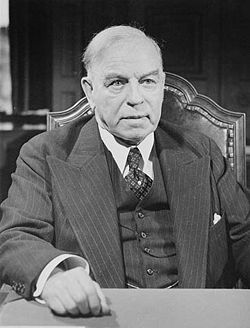| 15th Canadian Parliament | |||
|---|---|---|---|
| Minority parliament | |||
| Jan. 7, 1926 – Jul. 2, 1926 | |||
 | |||
| Parliament leaders | |||
| Prime minister | William Lyon Mackenzie King Dec. 29, 1921 – Jun. 28, 1926 | ||
| Arthur Meighen Jun. 29, 1926 – Sep. 25, 1926 | |||
| Cabinets | 12th Canadian Ministry 13th Canadian Ministry | ||
| Leader of the Opposition | Arthur Meighen Dec. 29, 1921 – Jun. 28, 1926 | ||
| William Lyon Mackenzie King Jun. 29, 1926 – Sep. 25, 1926 | |||
| Party caucuses | |||
| Government | Liberal Party [a] (until June 1926) | ||
| Conservative Party (after June 1926) | |||
| Opposition | Conservative Party (until June 1926) | ||
| Liberal Party (after June 1926) | |||
| Crossbench | Progressive Party | ||
| Labour | |||
| United Farmers of Alberta | |||
| House of Commons | |||
 Seating arrangements of the House of Commons | |||
| Speaker of the Commons | Rodolphe Lemieux 8 March 1922 – 2 June 1930 | ||
| Members | 245 MP seats List of members | ||
| Senate | |||
| Speaker of the Senate | Hewitt Bostock 7 February 1922 – 12 May 1930 | ||
| Government Senate leader | Raoul Dandurand 29 December 1921 – 28 June 1926 | ||
| William Benjamin Ross 28 June 1926 – 24 September 1926 | |||
| Opposition Senate leader | William Benjamin Ross 1 January 1926 – 28 June 1926 | ||
| Raoul Dandurand 29 June 1926 – 31 December 1926 | |||
| Senators | 96 senator seats List of senators | ||
| Sovereign | |||
| Monarch | George V 6 May 1910 – 20 January 1936 | ||
| Governor general | Viscount Byng of Vimy 11 August 1921 – 2 October 1926 | ||
| Sessions | |||
| 1st session January 7, 1926 – July 2, 1926 | |||
| |||

The 15th Canadian Parliament was in session from 7 January 1926, until 2 July 1926. The membership was set by the 1925 federal election on 29 October 1925, and it changed only somewhat due to resignations and by-elections until it was dissolved prior to the 1926 election.
Contents
- List of members
- Alberta
- British Columbia
- Manitoba
- New Brunswick
- Nova Scotia
- Ontario
- Prince Edward Island
- Quebec
- Saskatchewan
- Yukon
- By-elections
- Notes
- References
- Succession
Initially, it was controlled by a Liberal Party House minority under Prime Minister William Lyon Mackenzie King and the 12th Canadian Ministry. The Liberal caucus did not have a majority of seats in the House - it only had the second most seats - and was propped up by the Progressive Party of Canada MPs. The Official Opposition was the Conservative Party, led by Arthur Meighen. When the Liberal government fell, Meighen's Conservatives were allowed to form government (the 13th Canadian Ministry), triggering the "King-Byng Affair". Quickly the 13th Ministry fell as well.
The Speaker was Rodolphe Lemieux. See also List of Canadian electoral districts 1924-1933 for a list of the ridings in this parliament.
The unusual case of a new party taking control of the government between elections has only happened twice in Canadian history; the other occasion was in the 2nd Canadian parliament.
There was only one session of the 15th Parliament:
| Session | Start | End |
|---|---|---|
| 1st | 7 January 1926 | 2 July 1926 |